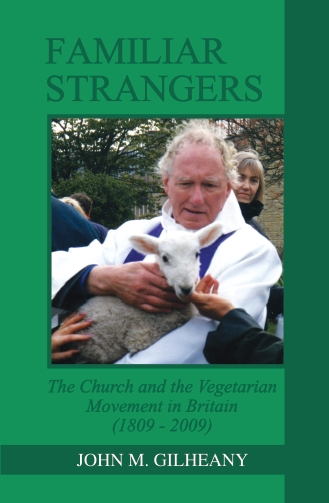
The Church and the Vegetarian
movement in Britain
(1809 - 2009)
by John M. Gilheany

About Familiar Strangers
In 1809 the origins of the vegetarian movement were set in place with the foundation of the Bible Christian Church of Salford.
The radical sect, whose congregation included local Civic leaders and the first M.P. for Salford, Joseph Brotherton (1783 - 1857) was instrumental in the formation of the Vegetarian Society, in 1847. Towards the end of the nineteenth century, the wider Food Reform movement had developed both secular and spiritual ideals which attracted a notable proportion of Christians.
Among the more prominent religious figures to have shared an association with Christian vegetarianism have been John and Charles Wesley; General William Booth, C.H Spurgeon, Leo Tolstoy, Lord Soper, and even Mahatma Gandhi.
The reluctance of the Vegetarian Society to adopt an overtly theological stance led to the formation of related but distinctly religious organisations. The Order of the Golden Age became particularly influential during the Edwardian period whilst operating from prestigious offices in London's Knightsbridge. Indeed, the most remarkable achievement of the forgotten organisation occurred in 1907, when their propaganda was met with a change in diet on the part of Pope Pius X!
Inevitably the movement had its critics, and none more towering than G.K. Chesterton, whose scathing satire led to decades of debate and banter with his dearest adversaries; of whom the foremost was George Bernard Shaw.
The vegetarian movement entered into a decline after the Second World War from which it was unable to recover until the Counter Culture of the 1960s eventually gave rise to the modern animal rights movement and renewed Christian activity.
The relationship between the Church and the Vegetarian movement has remained one of distant intimacy which was as fraught a century ago as it is today.
Available now